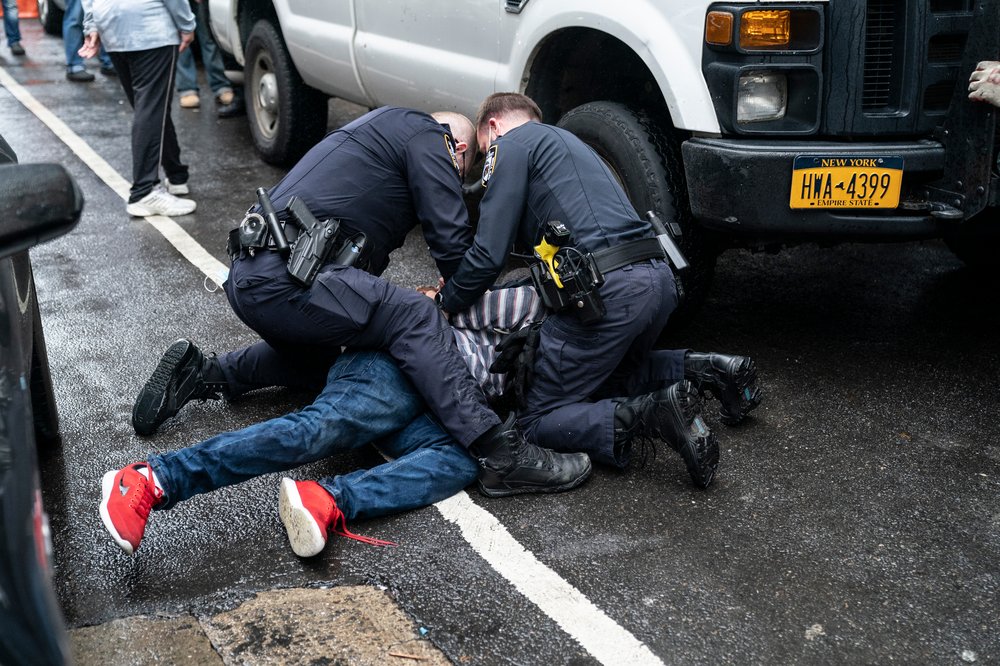NYPD already gets hundreds of annual abuse complaints for forcing people to hospitals
Dec. 1, 2022, 11:11 a.m.
It’s unclear how these numbers will be affected by the city’s new policy for involuntarily removing people with presumed mental illness from streets and subways.

NYPD detain a man following a public disturbance on Murray Street in Manhattan, Oct. 13, 2020. A new mayoral directive expands who can be forcibly removed from public spaces under mental hygiene laws.
This week, Mayor Eric Adams announced a policy allowing emergency responders to transport people to hospitals for mental illness evaluations against their will. But a review of city data shows New Yorkers already file hundreds of annual complaints about the practice.
The mayor’s new directive expands who can be forcibly removed from public spaces under mental hygiene laws. In the past, peace officers, police and other first responders could order such a move if a person appeared to have a mental illness — and posed an obvious threat of harm to themselves or others. The new rule removes the overt threat requirement, permitting involuntary removal if a person “displays an inability to meet basic living needs.”
The Civilian Complaint Review Board, an independent city agency that investigates reports of police misconduct, shares aggregated data on complaints submitted each year. Since 2017, the agency has recorded close to 2,700 allegations that police abused their power by sending someone to the hospital against their will.
Another 400-plus allegations involved officers who made threats to do the same. On average, the CCRB logged more than 500 annual complaints related to involuntary hospitalization over this period. Complaints can be submitted by anyone who sees or experiences what they believe to be police misconduct.
Reports of involuntary hospitalization have also risen lately, even as the overall number of police misconduct allegations has decreased slightly. Submissions related to involuntary hospitalization have more than tripled since 2017, and they account for about 5% – one of every 20 — allegations filed with the CCRB in 2022 so far.
It’s not clear how comprehensive the tally is, said CCRB spokesperson Clio Calvo-Platero. It may not include the accounts of people lacking the ability to file complaints. Say, as an example, a person living on the street without access to a phone or internet. Some people’s experiences may be underrepresented. The data provided by the CCRB also excludes demographic information — such as age, race and ethnicity. And many cases lack a solid conclusion: more than two-thirds are either pending or unable to be fully investigated because there’s not enough evidence one way or the other. In another 29%, the CCRB found no wrongdoing by officers.
Even when it’s deemed necessary to protect a person who’s a danger to themselves or others, involuntary hospitalization can be traumatic, mental health experts said, and involving police can add a new layer of danger.
“When people are in the throes of a crisis, they don’t need to see someone with a badge and a gun,” said Matt Kudish, executive director of the National Alliance on Mental Illness of New York City. “They need to see a mental health response to a mental health challenge. Not a criminal, legal response to a mental health challenge.”
An NYPD spokesperson told Gothamist that the department only received the new guidance on Tuesday — the same day it was announced to the public.
Other recent city initiatives have focused on reducing the role of police in responding to people in crisis. For example, the Behavioral Health Emergency Assistance Response Division pilot program — also known as B-HEARD — routes mental health emergency calls to teams of social workers and EMTs instead of police. The New York Times reported last month that the program is facing a $12 million budget cut.
It’s also not yet clear how police will be trained for their newly expanded role. An NYPD spokesperson told Gothamist that the department only received the new guidance on Tuesday — the same day it was announced to the public.
“The NYPD is currently in the process of aligning its policy, guidance and training in conformance with the mayor’s directive,” the spokesperson wrote.
Lawyers for local civil rights groups raised concerns about deputizing police officers, who aren’t trained health professionals, to decide whether someone should be hospitalized.
“The last group of people who should be doing this is the police department,” said Norman Siegel, the former director of the New York Civil Liberties Union, on WNYC’s “Morning Edition” after the policy was announced. “Cops are not trained. They bring their own biases, as we all know. They have their own stereotypes in their heads, and you can't with one afternoon training take that out of their heads. I think this is gonna create more problems.”
This story was updated to clarify comments from CCRB spokesperson Clio Calvo-Platero.
Mayor Adams directs NYPD, first responders to involuntarily take mentally ill to hospitals NYC Mayor Adams has a mental health agenda. Will Albany play ball?